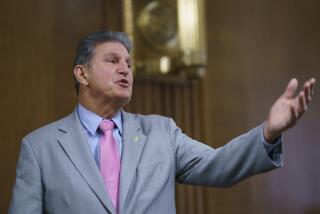Boskin, Rostenkowski Oppose Changing Budget Accord
- Share via
HOT SPRINGS, Va. — White House economic adviser Michael J. Boskin told the nation’s top business leaders Saturday that the Bush Administration essentially agrees with their gloomy view that a vulnerable economy is crawling slowly out of recession.
Meeting reporters after speaking privately to business executives attending the fall session of the Business Council here in Virginia’s mountains, Boskin also said that an economy facing major structural changes in the 1990s and a persistent shortage of bank lending may limp along with the unemployment rate moving down only very slowly from its present 6.7% level.
The council members--all executives of the nation’s largest corporations--also heard House Ways and Means Committee Chairman Dan Rostenkowski (D-Ill.). The congressman told reporters later that “we’ve been standing on the runway a long time. This is the longest climb out (of recession) in history.” He chided the White House for unrealistic optimism.
But Boskin and Rostenkowski, perhaps unexpectedly, found common ground in opposing the move among some House Democrats to reopen last year’s agreement on reducing the budget deficit and divert billions in Defense Department funds to domestic programs.
“I don’t like the idea,” Rostenkowski said. “You can get into political mischief. There are too few (House) members of like minds as to what to do with the money.”
He said that the capital was rife with rumors “that the White House is rethinking their stubbornness in not renegotiating the budget agreement. But I don’t want to.”
Boskin made it plain that the Administration is firm on that point. “The budget deal should not be reopened and the Administration does not intend to do so,” he said.
Boskin went on to say that the ballooning deficits, now estimated at $250 billion for the fiscal year that ended last month and $380 billion for fiscal 1992 are primarily the fault of the sluggish pace of resolving the savings and loan debacle and selling off the assets of failed thrift institutions.
“It has nothing to do with the economy, which has performed as we expected, or with the budget agreement,” he said.
Rostenkowski suggested that the slow recovery will produce a rash of domestic issues in next year’s campaign, whether or not those issues ever translate into workable programs to improve education, reduce health care costs, expand health insurance and eliminate drug abuse.
He also said that Democratic proposals to win back middle class voters by promoting greater tax “fairness” probably will not result in legislation this year that would cut taxes.
But, he said, a proposal to impose surtaxes on millionaires would be a big political winner. “It won’t get a lot of money,” he conceded. “But for political fodder, everybody understands that.” Such a surtax would raise barely $5 billion, he said, not enough to offset a tax cut for the middle class.
Boskin said that any tax changes should be within the framework of an “economic growth package” such as some Republican lawmakers have proposed, including such components as business and individual tax credits and lower taxes on capital gains.
In his comments, Boskin also looked ahead to a period in which large corporations--service industries in particular--will have to reduce employment and restructure to achieve higher productivity and thus compete with the rest of the world.
“We will have to save and invest more, borrow less, spend less, make research and development more commercial, improve the skills of the labor force,” he said. These are all familiar prescriptions, he said, but they add up to a period of adjustment, during which consumers may be more cautious than in past economic recoveries.
More to Read
Get the L.A. Times Politics newsletter
Deeply reported insights into legislation, politics and policy from Sacramento, Washington and beyond. In your inbox twice per week.
You may occasionally receive promotional content from the Los Angeles Times.










